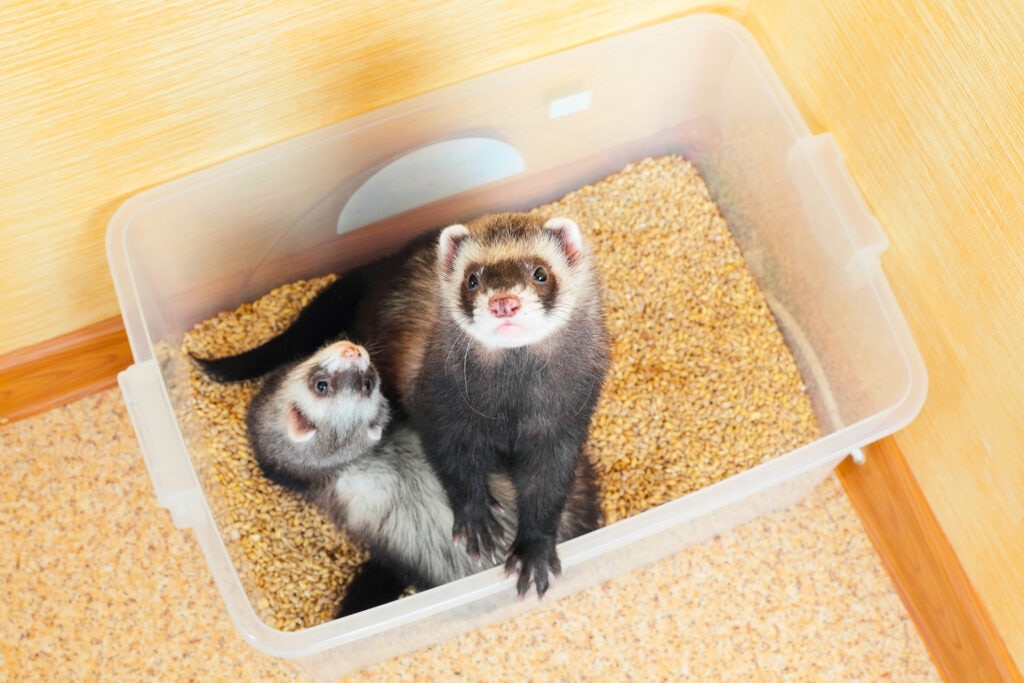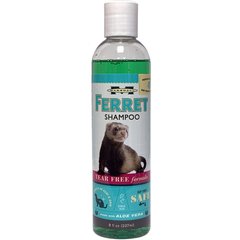Do Ferrets Stink? Here’s Why Ferrets Smell and How To Improve Their Scent

Photo by Two Ferrets looking in camera, top view
If you’ve spent any time around ferrets, you might know they have a signature musky odor that many pet parents find endearing. But why do ferrets stink?
Turns out, a lot of their unique odor comes from their biology—specifically the scent glands all over their body—but their environment can play a role too. We talked to two exotic pet experts to get the scoop on ferret smells and what you can do to freshen things up if you want to keep one (or two!) in your home.
Do Ferrets Stink?
Yes, ferrets stink regardless of age or health status. Ferret smell is totally normal, and it’s an expected part of having a ferret companion, says Michael McEntire, DVM, a board-certified specialist in zoological medicine and assistant professor of zoological medicine at Utah State University.
However, some ferrets do smell more than others, and their diet and environment can contribute to their odor too.
Why Do Ferrets Smell?
For starters, ferrets have scent glands all over their body that produce secretions that give them a musky smell. Because of this, ferrets are actually used as a model species in neuroscience for studying the olfactory system (the system behind the sense of smell), says Rae Porter-Blackwell, DVM, ABVP, a board-certified exotic companion mammal specialist at The Center for Bird and Exotic Animal Medicine and vice president of the Association of Exotic Mammal Veterinarians.
Ferrets use their scent as a unique form of communication and have a lot of behaviors that are specific to scent and scent marking. They also rely on scent to share information about their territory and reproductive status. But while ferrets have scent glands everywhere, their stinkiest scent glands are their anal sacs, says Dr. Porter-Blackwell.
Because the smell from their anal sacs is so potent, these scent glands are often removed in a procedure called descenting. In fact, most ferrets in the United States are bred commercially, and they are descented when they’re spayed or neutered, Dr. McEntire says. This significantly lessens their smell, but it doesn’t eliminate it.
While a lot of a ferret’s odor has to do with their biology, their environment can play a role too. In fact, Dr. McEntire says one of the biggest issues with ferret odor is the smell of their feces, and there are several things you can do to help with that.
Some smells are normal parts of owning a ferret, but there are some other types of odors that should cause concern. In these cases, you’ll want to have your vet investigate:
- Extra stinky poops: If your ferret’s poops are extra stinky, it might be a sign of an upset stomach or other intestinal issues, says Dr. Porter-Blackwell.
- Dental disease: Dental disease is common in ferrets and can result in bad breath. If you notice your ferret’s breath smells different than usual, take them to the vet for a checkup.
- Infections: McEntire says ferrets like to squeeze into places they shouldn’t, which can result in wounds that ultimately get infected. Infected wounds often have a scent that’s more putrid and less musky than a ferret’s typical smell.
Ultimately, if you’re smelling something different on your ferret, it’s not a bad idea to have them checked out, but their normal musky scent isn’t a cause for concern.
How To Minimize Ferret Smell
If a ferret’s natural scent bothers you, there are some things you can do to try to minimize the odor:
- Spay or neuter your ferret. Scent glands are larger in ferrets that haven’t been spayed or neutered, which can make them smell more. Most commercially bred ferrets in the United States are already spayed or neutered, but if yours hasn’t been yet, getting this procedure done can significantly reduce their smell.
- Get your ferret’s anal glands removed. As mentioned, most of a ferret’s odor comes from their anal glands. Dr. McEntire says if your ferret is intact, it’s likely they still have their anal glands too. Getting these glands removed can be done at the same time as spaying or neutering.
- Feed them a high-quality diet. Ferrets are obligate carnivores, which means they need a diet that consists mainly of meat to get all the nutrients they need, namely protein. Dr. McEntire recommends a good-quality ferret diet, like Oxbow’s Essentials Ferret Food. The right diet can significantly improve the smell of their feces.
- Keep their enclosure clean. Regularly cleaning your ferret’s enclosure, keeping their litter box clean, and washing any bedding or hammocks is also key to controlling odor.
- Put their enclosure in a well-ventilated area. Despite your best efforts, ferrets always come with some sort of odor, but putting their enclosure in a well-ventilated area with plenty of airflow can help keep the air fresher. You can also set up odor-controlling air purifiers to help control the smell in your environment.
- Give them baths. Porter-Blackwell says baths can be helpful if you notice your ferret isn’t grooming themselves well and that’s contributing to their stink. However, bathing won’t get rid of their normal musky smell.
How To Prevent Ferret Smell
Recommended Products
Unfortunately, there’s no way to completely prevent a ferret’s scent. “But they are cute and adorable, and that is just part of their quirky charm,” says Dr. McEntire.
That said, their scent can be managed with the right diet and care. Things like a high-quality, protein-rich diet, regular cage and environmental cleaning, and occasional bathing can significantly reduce ferret odor.
Using an air purifier can help to remove unpleasant odors. Neutering male ferrets can also help significantly reduce their natural musky scent. When in doubt, contact your veterinarian for help to ensure you are taking the best care of your pet ferret.







